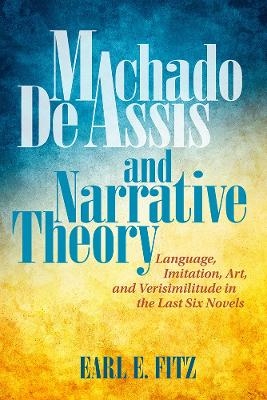
Machado de Assis and Narrative Theory
Language, Imitation, Art, and Verisimilitude in the Last Six Novels
Seiten
2019
Bucknell University Press,U.S. (Verlag)
978-1-68448-113-2 (ISBN)
Bucknell University Press,U.S. (Verlag)
978-1-68448-113-2 (ISBN)
Argues that Machado de Assis, hailed as one of Latin American literature's greatest writers, was also a major theoretician of the modern novel form. Had the Brazilian master written not in Portuguese but English, French, or German, he would today be regarded as one of the true exemplars of the modern novel, in expression as well as in theory.
This book makes the argument that Machado de Assis, hailed as one of Latin American literature’s greatest writers, was also a major theoretician of the modern novel form. Steeped in the works of Western literature and an imaginative reader of French Symbolist poetry, Machado creates, between 1880 and 1908, a “new narrative,” one that will presage the groundbreaking theories of Swiss linguist Ferdinand de Saussure by showing how even the language of narrative cannot escape being elusive and ambiguous in terms of meaning. It is from this discovery about the nature of language as a self-referential semiotic system that Machado crafts his “new narrative.” Long celebrated in Brazil as a dazzlingly original writer, Machado has struggled to gain respect and attention outside the Luso-Brazilian ken. He is the epitome of the “outsider” or “marginal,” the iconoclastic and wildly innovative genius who hails from a culture rarely studied in the Western literary hierarchy and so consigned to the status of “eccentric.” Had the Brazilian master written not in Portuguese but English, French, or German, he would today be regarded as one of the true exemplars of the modern novel, in expression as well as in theory.
Published by Bucknell University Press. Distributed worldwide by Rutgers University Press.
This book makes the argument that Machado de Assis, hailed as one of Latin American literature’s greatest writers, was also a major theoretician of the modern novel form. Steeped in the works of Western literature and an imaginative reader of French Symbolist poetry, Machado creates, between 1880 and 1908, a “new narrative,” one that will presage the groundbreaking theories of Swiss linguist Ferdinand de Saussure by showing how even the language of narrative cannot escape being elusive and ambiguous in terms of meaning. It is from this discovery about the nature of language as a self-referential semiotic system that Machado crafts his “new narrative.” Long celebrated in Brazil as a dazzlingly original writer, Machado has struggled to gain respect and attention outside the Luso-Brazilian ken. He is the epitome of the “outsider” or “marginal,” the iconoclastic and wildly innovative genius who hails from a culture rarely studied in the Western literary hierarchy and so consigned to the status of “eccentric.” Had the Brazilian master written not in Portuguese but English, French, or German, he would today be regarded as one of the true exemplars of the modern novel, in expression as well as in theory.
Published by Bucknell University Press. Distributed worldwide by Rutgers University Press.
EARL E. FITZ is a professor of Portuguese, Spanish, and comparative literature at Vanderbilt University in Nashville, Tennessee.
Abbreviations .. iv
A Note on Translations... v
Introduction ... 1
One - The Posthumous Memoirs of Brás Cubas ... 95
Two - The Psychiatrist ... 132
Three - Quincas Borba ... 169
Four - Dom Casmurro ... 196
Five - Esau and Jacob ... 235
Six - Counselor Ayres Memorial ... 260
Conclusion ... 283
Acknowledgements ... 310
Bibliography ... 311
Index ... 324
About the Author ... 325
| Erscheinungsdatum | 20.07.2019 |
|---|---|
| Sprache | englisch |
| Maße | 152 x 229 mm |
| Gewicht | 454 g |
| Themenwelt | Geisteswissenschaften ► Philosophie ► Philosophie der Neuzeit |
| Geisteswissenschaften ► Sprach- / Literaturwissenschaft ► Anglistik / Amerikanistik | |
| Geisteswissenschaften ► Sprach- / Literaturwissenschaft ► Literaturgeschichte | |
| Geisteswissenschaften ► Sprach- / Literaturwissenschaft ► Literaturwissenschaft | |
| ISBN-10 | 1-68448-113-9 / 1684481139 |
| ISBN-13 | 978-1-68448-113-2 / 9781684481132 |
| Zustand | Neuware |
| Haben Sie eine Frage zum Produkt? |
Mehr entdecken
aus dem Bereich
aus dem Bereich


